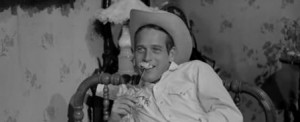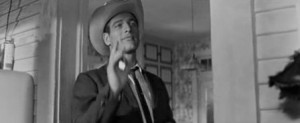Looking up at his son, who cradles the old man in his arms, Homer murmurs, “Hud there, waitin’ on me . . . and he ain’t a patient man.” After his grandfather dies, Lon takes the body rather possessively from Hud, who seems to understand the gesture. Hud’s latest cruelty is the final straw for Lon, and rather than hang around as Hud’s hired hand, he leaves. He asks that his share of the spread be deposited in the bank and takes off walking, all his possessions in a single suitcase.
 James Wong Howe’s Oscar-winning black-and-white cinematography captures the vastness of the wide open Texas spaces and underscores the darkness and isolation of Hud’s malignant haze. Not unlike the opening of many another open-spaces film, the camera follows a vehicle across the flat landscape to an ordinary little town, with its single, bare railroad crossing. In a number of scenes, Ritt and Howe aren’t afraid to allow the camera to remain on the actors, without over-cutting, as when Homer tells Hud what he thinks of him and when the old man is dying.
James Wong Howe’s Oscar-winning black-and-white cinematography captures the vastness of the wide open Texas spaces and underscores the darkness and isolation of Hud’s malignant haze. Not unlike the opening of many another open-spaces film, the camera follows a vehicle across the flat landscape to an ordinary little town, with its single, bare railroad crossing. In a number of scenes, Ritt and Howe aren’t afraid to allow the camera to remain on the actors, without over-cutting, as when Homer tells Hud what he thinks of him and when the old man is dying.
From Irving Ravetch and Harriet Frank, Jr.’s literate screenplay, the film is replete with long dialogue scenes, which I thoroughly enjoy. This character-building and personal relationship development would not be allowed, or watched, today. The leisurely pace of the film is occasionally broken by bits of action: a brief restaurant fight, a greased pig contest, Hud’s assault on Alma and the killing of the herd, if that last can be regarded as “action.” Time is given to creating an authentic sense of life on a ranch, much as life on an Amish farm is shown in Witness, a movie which, even now, vivid and fresh in my mind, seems anachronistic in the present.
Elmer Bernstein’s score is appropriately less overt and rhythm-driven than those for his more conventional Westerns—The Magnificent Seven, The Comancheros and True Grit. Although somehow associated with this genre, for the music in these three films has such a strong masculinity, Bernstein didn’t score as many Westerns as one would think. Probably Alfred Newman and Jerry Goldsmith scored more, and certainly Dimitri Tiomkin is credited with more than those three composers combined.
Rather, the music for Hud is as it should be in this case: understated, when it’s there at all—hardly noticed at times, the sign, some say, of a “good” score—with, here and there, a lonely guitar, as behind the main title. The drama is strong enough that it doesn’t need music. In its subtlety and sparseness, the score recalls Bernstein’s To Kill a Mockingbird, though it’s hardly in that class.
 In the last shot of the film, after going inside the house, Hud opens the screen door to watch Lon leave, shrugs and turns back into the house. Most likely, Hud doesn’t care whether he’s alone or not. After all, he’s his own man. It’s as if he has no memory of those who have shared his life and who have now left the ranch.
In the last shot of the film, after going inside the house, Hud opens the screen door to watch Lon leave, shrugs and turns back into the house. Most likely, Hud doesn’t care whether he’s alone or not. After all, he’s his own man. It’s as if he has no memory of those who have shared his life and who have now left the ranch.